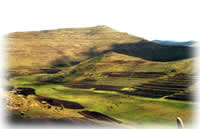 |
 |
||
 |
|||
|
RELATED THEMES community activities compensation environment justice and crime OTHER LOCAL THEMES BACKGROUND |
agriculture
The principal crops are maize, wheat and cannabis, which is the main cash crop. Farmers have experimented with other crops, and established that pulses can be grown, though much less successfully than maize and wheat. Although the soil is fertile, people stress that they work it hard by, for example, turning the soil in winter and also alternating the two main food crops - in order to "fatten the soil". Other crops mentioned are rye, potatoes and sorghum. People cultivate small vegetable gardens as well as their fields. Farmers collect and conserve their own seed. Sowing in lines has replaced broadcasting, a change that people say has led to better yields (although a minority hold that the harvest was better in the past). New varieties have been introduced, including a type of maize known as "the stalk is hairy", which is said to have increased yields but, to some, tastes less good than traditional varieties. quotes about agriculture"Each and every crop, we plant each and every crop - peas, beans, wheat, maize like that, pumpkins, potatoes, every single thing we planted and ate and became full in the stomach." "Most of us [make rows] by hands only; when cattle [pulling a plough] come out that side, I am holding a little tin by this hand of mine, I am just making rows. I am taking out two maize [seeds] and two cannabis [seeds] and I throw them into the furrow, like that." "I depend mainly on agriculture like most people in this village. We grow maize, sorghum and different vegetables. We also have wild vegetables to supplement our diet in case of severe drought. Basically, we are self sufficient in this village. The surrounding villages often come to our village for food and we sell them whatever surplus we have." |
|
 Agriculture is absolutely central to the life of the community. Narrators claim that the area is essentially agriculturally self-sufficient and there is often some surplus. Although the environment is harsh, the soil is black and fertile from alluvial deposits; as one narrator puts it,
Agriculture is absolutely central to the life of the community. Narrators claim that the area is essentially agriculturally self-sufficient and there is often some surplus. Although the environment is harsh, the soil is black and fertile from alluvial deposits; as one narrator puts it,